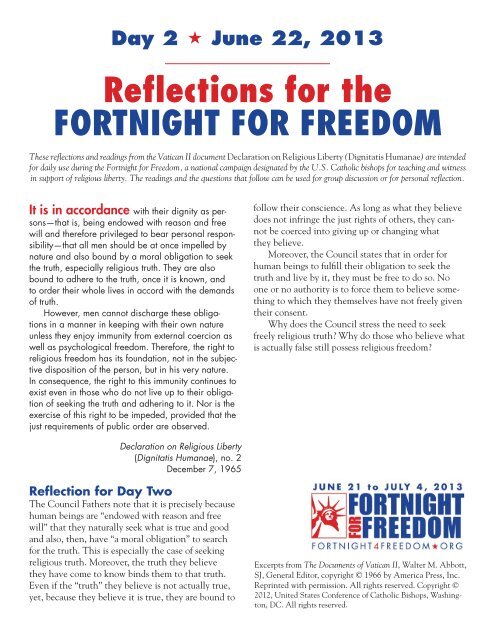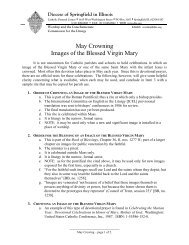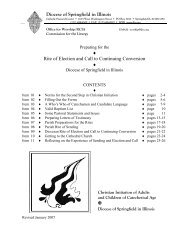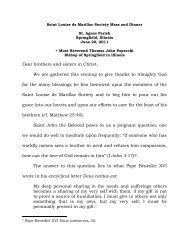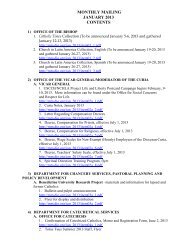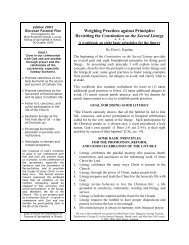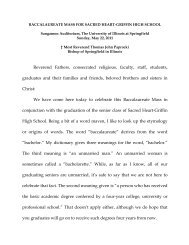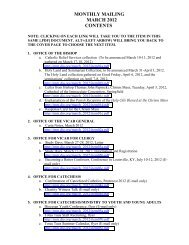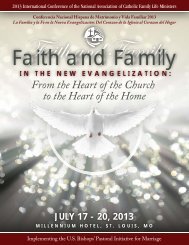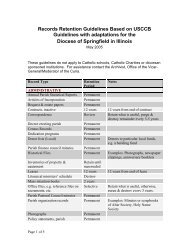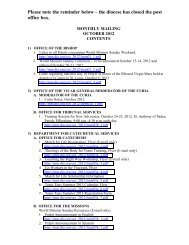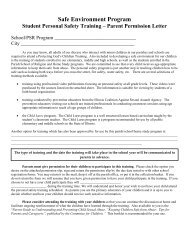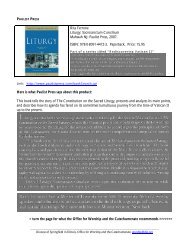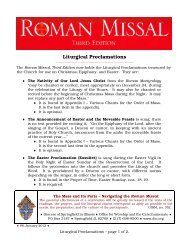Day 2 June 22, 2013Reflections for theFORTNIGHT FOR FREEDOMThese reflections and read<strong>in</strong>gs from the Vatican II document Declaration on Religious Liberty (Dignitatis Humanae) are <strong>in</strong>tendedfor daily use dur<strong>in</strong>g the <strong><strong>For</strong>tnight</strong> for <strong>Freedom</strong>, a national campaign designated by the U.S. Catholic bishops for teach<strong>in</strong>g and witness<strong>in</strong> support <strong>of</strong> religious liberty. The read<strong>in</strong>gs and the questions that follow can be used for group discussion or for personal reflection.It is <strong>in</strong> accordance with their dignity as persons—thatis, be<strong>in</strong>g endowed with reason and freewill and therefore privileged to bear personal responsibility—thatall men should be at once impelled bynature and also bound by a moral obligation to seekthe truth, especially religious truth. They are alsobound to adhere to the truth, once it is known, andto order their whole lives <strong>in</strong> accord with the demands<strong>of</strong> truth.However, men cannot discharge these obligations<strong>in</strong> a manner <strong>in</strong> keep<strong>in</strong>g with their own natureunless they enjoy immunity from external coercion aswell as psychological freedom. Therefore, the right toreligious freedom has its foundation, not <strong>in</strong> the subjectivedisposition <strong>of</strong> the person, but <strong>in</strong> his very nature.In consequence, the right to this immunity cont<strong>in</strong>ues toexist even <strong>in</strong> those who do not live up to their obligation<strong>of</strong> seek<strong>in</strong>g the truth and adher<strong>in</strong>g to it. Nor is theexercise <strong>of</strong> this right to be impeded, provided that thejust requirements <strong>of</strong> public order are observed.follow their conscience. As long as what they believedoes not <strong>in</strong>fr<strong>in</strong>ge the just rights <strong>of</strong> others, they cannotbe coerced <strong>in</strong>to giv<strong>in</strong>g up or chang<strong>in</strong>g whatthey believe.Moreover, the Council states that <strong>in</strong> order forhuman be<strong>in</strong>gs to fulfill their obligation to seek thetruth and live by it, they must be free to do so. Noone or no authority is to force them to believe someth<strong>in</strong>gto which they themselves have not freely giventheir consent.Why does the Council stress the need to seekfreely religious truth? Why do those who believe whatis actually false still possess religious freedom?Declaration on Religious Liberty(Dignitatis Humanae), no. 2December 7, 1965Reflection for Day TwoThe Council Fathers note that it is precisely becausehuman be<strong>in</strong>gs are “endowed with reason and freewill” that they naturally seek what is true and goodand also, then, have “a moral obligation” to searchfor the truth. This is especially the case <strong>of</strong> seek<strong>in</strong>greligious truth. Moreover, the truth they believethey have come to know b<strong>in</strong>ds them to that truth.Even if the “truth” they believe is not actually true,yet, because they believe it is true, they are bound toExcerpts from The Documents <strong>of</strong> Vatican II, Walter M. Abbott,SJ, General Editor, copyright © 1966 by America Press, Inc.Repr<strong>in</strong>ted with permission. All rights reserved. Copyright ©2012, United States Conference <strong>of</strong> Catholic Bishops, Wash<strong>in</strong>gton,DC. All rights reserved.
Day 3 June 23, 2013Reflections for theFORTNIGHT FOR FREEDOMThese reflections and read<strong>in</strong>gs from the Vatican II document Declaration on Religious Liberty (Dignitatis Humanae) are <strong>in</strong>tendedfor daily use dur<strong>in</strong>g the <strong><strong>For</strong>tnight</strong> for <strong>Freedom</strong>, a national campaign designated by the U.S. Catholic bishops for teach<strong>in</strong>g and witness<strong>in</strong> support <strong>of</strong> religious liberty. The read<strong>in</strong>gs and the questions that follow can be used for group discussion or for personal reflection.Further light is shed on the subject if one considersthat the highest norm <strong>of</strong> human life is the div<strong>in</strong>elaw—eternal, objective, and universal—whereby Godorders, directs, and governs the entire universe and allthe ways <strong>of</strong> human community, by a plan conceived<strong>in</strong> wisdom and love. Man has been made by God toparticipate <strong>in</strong> this law, with the result that, under thegentle disposition <strong>of</strong> div<strong>in</strong>e Providence, he can come toperceive ever <strong>in</strong>creas<strong>in</strong>gly the unchang<strong>in</strong>g truth. Henceevery man has the duty, and therefore the right, to seekthe truth <strong>in</strong> matters religious, <strong>in</strong> order that he may withprudence form for himself right and true judgments <strong>of</strong>conscience, with the use <strong>of</strong> all suitable means.Truth, however, is to be sought after <strong>in</strong> a mannerproper to the dignity <strong>of</strong> the human person and hissocial nature. The <strong>in</strong>quiry is to be free, carried on withthe aid <strong>of</strong> teach<strong>in</strong>g or <strong>in</strong>struction, communication, anddialogue. In the course <strong>of</strong> these, men expla<strong>in</strong> to oneanother the truth they have discovered, or th<strong>in</strong>k theyhave discovered, <strong>in</strong> order thus to assist one another <strong>in</strong>the quest for truth. Moreover, as the truth is discovered,it is by a personal assent that men are to adhere to it.Declaration on Religious Liberty(Dignitatis Humanae), no. 3December 7, 1965Reflection for Day ThreeGod is the author <strong>of</strong> all truth and all good. All <strong>of</strong>what is true and good <strong>in</strong> our world and cosmos f<strong>in</strong>dsits source <strong>in</strong> God, the Creator <strong>of</strong> all. Moreover, whatis true and good about ourselves as human be<strong>in</strong>gsf<strong>in</strong>ds its source <strong>in</strong> God <strong>in</strong> that he created us <strong>in</strong> hisimage and likeness. Thus, for the Council Fathers, allthat exists is <strong>in</strong> conformity with the div<strong>in</strong>e law, theprovidential plan <strong>of</strong> God.Because <strong>of</strong> this, the Council emphasizes thattruth must be “sought after <strong>in</strong> a manner proper to thedignity <strong>of</strong> the human person and his social nature.”This means that human be<strong>in</strong>gs must be free to seekthe truth. However, human be<strong>in</strong>gs do not seek thetruth as isolated <strong>in</strong>dividuals. The search for the truthis common to all, and so all share <strong>in</strong> the f<strong>in</strong>d<strong>in</strong>g <strong>of</strong>truth and all share <strong>in</strong> the receiv<strong>in</strong>g <strong>of</strong> truth from others.Because the search for truth, the f<strong>in</strong>d<strong>in</strong>g <strong>of</strong> truth,and the shar<strong>in</strong>g <strong>of</strong> truth is a social exercise, humanbe<strong>in</strong>gs must not only be free to search for truth <strong>in</strong> thehope <strong>of</strong> f<strong>in</strong>d<strong>in</strong>g it, they must also be free to communicateand discuss together the truth they believe theyhave found. It is through our free assent that we eachpersonally lay hold <strong>of</strong> the truth.What are the contemporary means <strong>of</strong> seek<strong>in</strong>g,f<strong>in</strong>d<strong>in</strong>g, and shar<strong>in</strong>g truth? In what ways can this freedomto seek, to f<strong>in</strong>d, and to share be <strong>in</strong>hibited?Excerpts from The Documents <strong>of</strong> Vatican II, Walter M. Abbott,SJ, General Editor, copyright © 1966 by America Press, Inc.Repr<strong>in</strong>ted with permission. All rights reserved. Copyright ©2012, United States Conference <strong>of</strong> Catholic Bishops, Wash<strong>in</strong>gton,DC. All rights reserved.
- Page 8 and 9: the word of the angel, his punishme
- Page 10 and 11: Monday, July 1, 2013Monday, 13th We
- Page 22 and 23: Litany for LibertyFor use during th
- Page 24 and 25: Letanía por la LibertadPara uso du
- Page 26 and 27: Religious FreedomEcumenical Prayer
- Page 28 and 29: I mean that as long as the heir is
- Page 30 and 31: them, “Amen, amen, I say to you,
- Page 34 and 35: Day 4 June 24, 2013Reflections for
- Page 36 and 37: Day 6 June 26, 2013Reflections for
- Page 38 and 39: Day 8 June 28, 2013Reflections for
- Page 40 and 41: Day 10 June 30, 2013Reflections fo
- Page 42 and 43: Day 12 July 2, 2013Reflections for
- Page 44 and 45: Day 14 July 4, 2013Reflections for
- Page 46 and 47: natural death, the unique meaning o
- Page 48 and 49: in whom we find true freedom and la
- Page 50 and 51: So shall I have an answer for those
- Page 52 and 53: desires. If we live in the Spirit,
- Page 54 and 55: For marriage:For all married couple
- Page 56 and 57: What do we mean by religious libert
- Page 59 and 60: The FortnightContinuesAmid growing
- Page 61 and 62: MARRIAGE ANDRELIGIOUS FREEDOMUSCCB
- Page 63 and 64: DISCRIMINATION AGAINST CHRISTIANSTU
- Page 65 and 66: PROVIDING PASTORAL CARETO IMMIGRANT
- Page 67 and 68: RELIGIOUS LIBERTYATTACKED IN INDONE
- Page 69 and 70: RELIGIOUS FREEDOMATTACKED IN NIGERI


